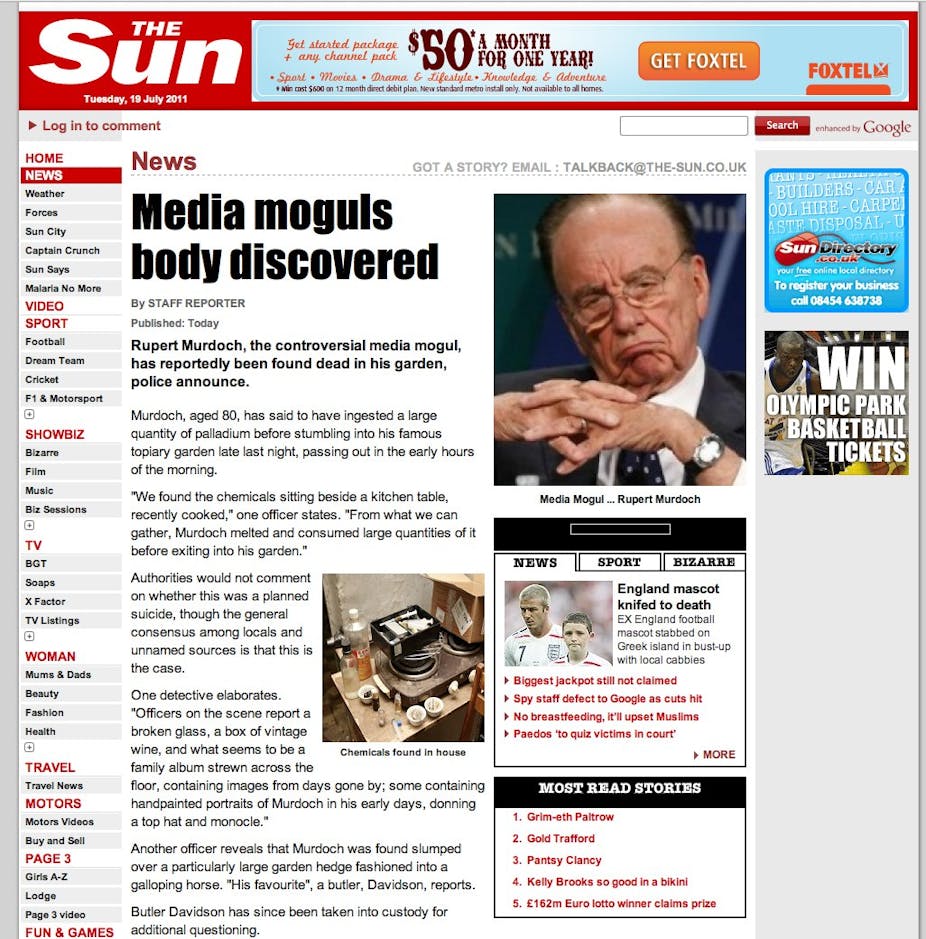An attack by computer hacker group LulzSec has shut down over 1000 websites owned by Rupert Murdoch’s News International, after the group posted a fake story on the website of Murdoch tabloid The Sun declaring the media mogul dead.
The attack came on the day that Murdoch is due to face a parliamentary hearing on allegations of widespread phone hacking at papers run by the British arm of his News empire, a scandal that led to the closure of UK tabloid_ News of The World._
LulzSec, which has previously hacked the PlayStation Network, PBS, the US Senate and the CIA website, followed the fake story post by redirecting the Sun’s website to the LulzSec Twitter feed, @LulzSec.
“WE HAVE JOY WE HAVE FUN, WE HAVE MESSED UP MURDOCH’S SUN,” said one tweet on the LulzSec feed.
“We have owned Sun/News of the World - that story is simply phase 1 - expect the lulz to flow in coming days,” said another, hinting that worse was to come.
‘Lulz’, a play on the term LOL or laugh-out-loud, refers to laughter.
“We are showing you a very small surface; the real damage is currently giving the admins heart attacks. ;).”
The group also leaked employee passwords and mobile phone numbers belonging to Sun staff members and encouraged people to call them. Tech website, Gizmodo, reported that Rebekah Brooks, the News International executive and former News of the World editor who was arrested this week, was among those whose email login details were leaked.
Philip Branch, a Senior Lecturer in Telecommunications at Swinburne University of Technology who has an interest in LulzSec, said it was thought that the group had disbanded.
“But if they are responsible, it’s entirely consistent with their strategy of going for big, juicy targets,” he said.
“Also, there’s an element of black humour here. Hacking a company that has carried out such appalling hacks does bring a wry smile.”
Some news outlets have reported that the attack may be the work of another hacker group called Anonymous, or perhaps the two groups working together but Dr Branch said the attacks bore all the hallmarks of LulzSec.
“There were rumours that Anonymous were planning an attack on the Sun, but I think (given the scant evidence) that it probably is LulzSec. First of all, LulzSec have claimed responsibility. Also, the attack is in keeping with that of LulzSec rather than Anonymous,” he said.
“Anonymous mostly go for distributed denial of service attacks, which this isn’t. Of course, who can tell, but my money would be on LulzSec.”
Most News International websites were down as of Tuesday morning, with attempts to access websites of The Sun, The Times and News International returning a ‘server not found’ message.
LulzSec posted a tweet at 10.07am AEST saying over 1000 News International websites were down.
“News International’s DNS servers (link web addresses to servers) and all 1,024 web addresses are down,” the message said.
Associate Professor David Glance, director of the Centre for Software Practice at the University of Western Australia, said LulzSec’s actions would be welcomed by many.
“The coming out of retirement of LulzSec for this hack reflects how low public opinion of News Corp and, in particular, the Murdoch family has sunk,” he said.
“The interesting thing about this is that the hack will probably be cheered as public anger to the phone hacking scandal finds ways of venting. The closure of the News of The World in particular is still regarded as a cynical ploy as it will likely transform into the Sunday Sun.”
“There is still a feeling that the public will not be satisfied until at least one of the Murdochs is seen to pay a price for the scandal. The positive reinforcement that LulzSec will get out of this will possibly mean that more hacks on News Corp’s assets will follow,” Associate Professor Glance predicted.
Mark Gregory, Senior Lecturer in Electrical and Computer Engineering at RMIT University and an expert in cyber security, said LulzSec’s motivations may be three-fold:
“One, to draw attention to LulzSec. Two, to show displeasure with News Corp. Or three, they believe they can find information that would make matters worse for News Corp.”

